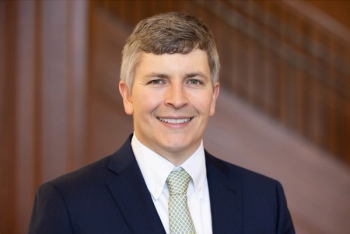
- Pharmaceutical Executive-04-01-2019
- Volume 39
- Issue 4
True Grit: Talent Management from the Ground Up
One company’s approach to recruiting and managing talent in an increasingly competitive marketplace.
How one small but fast-growing drugmaker is recruiting and managing talent through emulating the “grit” of its patients
Founded in 2008 as a startup with only a handful of employees and no office space, Horizon Pharma now has over 1,000 employees and 11 medicines that treat rare and rheumatic conditions. The Dublin-based company is striving to keep its startup mindset, however, and maintains that “our culture is no different today than it was when we started.” One aspect of this is in its approach to talent recruitment and development. Pharm Exec sat
down with Horizon’s executive vice president, chief human resources officer, Irina Konstantinovsky, who works out of the company’s US headquarters near Chicago, to discuss how the drugmaker is striving to build and empower agile and innovative teams that work together with speed, and to create a work environment that reflects the diversity of its patients.
PE: How is Horizon Pharma distinctive from other companies in the way it develops and manages talent?
KONSTANTINOVSKY: I think managing talent is truly core to what we do and core to our business strategy. Many CEOs write in their opening letters to employees that employees are their greatest asset, but this idea of an asset is quite confusing to me. Employees can leave; we don’t own them. What we need to do is invest in talent heavily; we truly believe in the idea that talent is our greatest investment. When we invest in talent-recruiting the best people, providing great development opportunities, ensuring competitive pay, fostering a great workplace-everything seems to fall into place. You create a virtuous cycle where people want to be engaged. They want to do and be their best to the company.
PE: What do you look for in new recruits?
KONSTANTINOVSKY: At the center of almost everything we do are three values: transparency, accountability, and growth. The behaviors that really bring those values to life form the architecture of our talent acquisition strategy. Something that our employees have to bring is “grit.” We used the theme of grit for one of our large meetings recently, when we brought a lot of employees together and talked about it being a very important part of who we are. Our patients deal with rare and difficult disease that can make it difficult to deal with everyday life, and they have to have grit. Similarly, we like our employees to have that same determination and motivation.
PE: What are the challenges around recruiting and developing new talent today?
KONSTANTINOVSKY: It’s a tough labor market, so good talent has a lot of choices. There’s a sea of very established pharmaceutical companies around us. A lot of the biotech talent is in Boston and in California. So sometimes, between the location and the established companies around us, we have to fight hard to find the right talent. I wouldn’t say we’re particularly challenged, but we definitely have to compete for that good talent.
One of the most challenging areas we have is marketing. Marketing is a difficult skill in the pharma industry in general. Most people with strong marketing backgrounds like to work for consumer products or in other areas, so we are constantly looking to upgrade talent and create internal development to make sure we have the pipeline of talent that we need to continue to grow and evolve as a company.
PE: How does mentorship fit into your talent-management strategy?
KONSTANTINOVSKY: Mentorship is one of the foundational elements you need, but I don’t think it’s a winning strategy per se. Having the right people in the organization to coach, counsel, and provide the right advice to our employees is incredibly important. But I’m more interested in the concept of sponsorship. Mentors are those people who sit down with you and offer advice and give you guidance on your career. But I see a sponsor as someone who would advocate for you in the right places.
Usually a sponsor is someone pretty senior in the organization, who is part of the discussions about where talent can go, what opportunities are there, what projects might be available. A sponsor is the person who says, “Well, I believe Kerry, who’s on the phone right now with me, should have that next opportunity.”
I’m also interested in the sponsorship concept from a diversity and inclusiveness perspective because, as we know, there are many more men than women in those discussions just by virtue of being the senior people in the room. So, if we can create a real system in the organization where we identify who our top women are, and we ensure that we connect them with mentors who eventually can become their sponsors, helping them to advance and grow in the organization, I think we’re onto something much more powerful than traditional mentorship. We need men as our allies to get to the top, and while most men would advocate for women, they maybe don’t have the systems to do that in an intentional way at the right time, and that’s what I want to create.
PE: How do you foster that commitment to diversity and inclusiveness across the organization?
KONSTANTINOVSKY: We have a very strong commitment to having a diverse and inclusive workforce. Diversity means having a mix of employees that can bring different backgrounds, different perspectives, and create the right innovation in the organization. About 15 months ago we started a very purposeful strategy around this. As a growing company that went from zero to a thousand employees at a very fast pace, things were just starting to happen at Horizon then, but now we have a real strategy that understands that inclusiveness at Horizon is personal and it starts with a commitment from the top. There is a diversity of people facing the health conditions that we’re trying to treat-disease does not discriminate-and we have to have that kind of mix in our workforce in order to bring the best solutions for our patients.
PE: You worked at larger companies before. How different is managing talent at Horizon?
KONSTANTINOVSKY: Horizon is a very different challenge. It is a much newer company, 10 years old, and it’s growing at an incredible pace. It’s very fast moving. So, you have to look at Horizon through a different lens. What the size of the organization really allows us to do is to take bigger bets on individuals. We can offer bigger roles and offer a much faster career path. We compete with very well-established organizations when we compete for talent, but our engagement philosophy and competitive element is to offer growth, both as an individual and as a member of the organization. We can offer, I think, a wider set of experiences that can be much more rewarding, if you’re looking and willing to be part of something that is ever-changing.
I also think that we touch our employees differently from a brand perspective. We take our mission personally; we’re not just employees, many of us know the patients. In a larger pharma company that’s much harder to say. Either we know our patients, we are a patient, or we’re impacted by our patients’ stories in a very personal way.
PE: How will you sustain your culture of talent management as the company grows?
KONSTANTINOVSKY: I think digitalization is key to that. We’re rolling out a new intranet, and a key part of that is to create communities where employees are able to come together and ask questions. New employees, for example, can access a community where they can really interact with each other, no matter where they are, and help each other be successful.
But one of my personal biggest challenges, or what keeps me awake at night, is how we maintain our culture of entrepreneurship, and of grit as we grow. For that, it’s essential to follow the feedback from our workforce and continue to invest in talent.
Julian Upton is Pharm Exec’s European and Online Editor. He can be reached at
Articles in this issue
almost 7 years ago
Biosimilars Name Game Remains Thorny Issuealmost 7 years ago
HBA's Woman of the Year 2019almost 7 years ago
Sharing Your Voicealmost 7 years ago
Health Technology’s Double-Edged Swordalmost 7 years ago
Reinventing Pharma’s Talent Searchalmost 7 years ago
Hiring a Chief Diversity Officeralmost 7 years ago
Are Pharma Marketers Fighting the Last War?almost 7 years ago
Ready Patient Onealmost 7 years ago
Pharmaceutical Executive, April 2019 Issue (PDF)almost 7 years ago
Country Report: ChinaNewsletter
Lead with insight with the Pharmaceutical Executive newsletter, featuring strategic analysis, leadership trends, and market intelligence for biopharma decision-makers.




